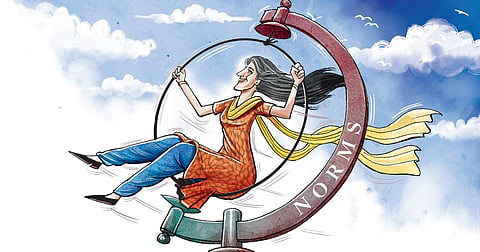

The annual meeting of governmental representatives that is dedicated to gender equality and women’s empowerment - Committee on the Status of Women (CSW) - as scheduled to start on March 9, 2020, in a landmark session that has now been truncated because of the coronavirus. Civil society members usually observe the official meetings and also have their own parallel programmes, as has become the norm with UN gatherings in recent decades. This year’s CSW meeting occurs in a year of many landmarks: just over 40 years of the Convention on the Elimination of All Forms of Discrimination against Women (CEDAW); 25 years after the Beijing Declaration and Platform for Action was adopted; 20 years after the passage of UN Security Council Resolution 1325; and five years since the Sustainable Development Goals were formulated.
Around the world, at local, national and transnational gatherings, women’s rights activists are asking: How far have we really come, and what are our most pressing concerns today? Just the fact that we have all these instruments, albeit observed more in the breach than otherwise, is a very big deal. Each one represents a universal normative consensus, even when insincere, that gender equality is desirable. To publicly and officially accept this idea, in the face of daily patriarchy-driven lives that express just the opposite, makes for a remarkable historical moment. It is the social change equivalent of ‘fake it till you make it’.
Transnational solidarities have always been a part of feminist history. For instance, while Indian women played a part in the suffrage movement in Britain, British women in India were instrumental in founding the first Indian organisation to ask for the right of Indian women to vote, the Women’s Indian Association. Women from around the world played a part in the League of Nations and that role expanded at the time of the San Francisco conference where the United Nations was founded. In the age of the internet, improved communication and easier travel, this has expanded to include more (but not enough) women beyond elite circles in national capitals.
Preparation for these anniversaries centres primarily around progress reports, prepared by governments and civil society organisations. Government reports, as you might expect, are relatively sanguine and sandpaper over problem areas. The shadow reports are a rich source of information, even integrating local perspectives on national narratives. To be fair, the United Nations system (UN Women, in particular) invests a great deal of energy in fashioning consultative processes but there remains, inevitably, a huge gulf between their reach and local groups and communities.
What is the connection between our daily lives and these mammoth events happening in places far away? The first reason why these international conventions, of whose existence we are barely aware, are important is that they set the bar for national governments. In this, the gender equality conventions work just like the Universal Declaration of Human Rights. They allow us to point and say, look, we have this right that you are violating, even after you ratified it. They also offer templates for national legislation. For instance, the definition of domestic violence in India’s Protection of Women from Domestic Violence Act, 2005, draws on Article 23 of CEDAW’s General Recommendation 19, 1992, which specifically addresses violence against women.
The United Nations has a limited capacity to enforce, and states (governments) are culpable in the violation of rights—since it is primarily against potential violations by the state that we enjoy them. Therefore, these conventions may be flouted but as their norms gain acceptance in international society, other governments and civil society in other countries may in fact create a climate of strong disapproval, leading to isolation. In 2001, when the US decided to attack Afghanistan, the violation of women’s rights by the Taliban was proffered as partial justification. The US government could be confident that hardly any other country could say they opposed women’s rights anymore.
For women’s rights activists, transnational networks have always been a source of learning and mutual support. Women peace activists and labour activists have worked in concert from the early decades of the twentieth century; indeed, the origins of International Women’s Day lie in the campaigns by European socialists to secure working women the right to safe, decent work and wages. Both the League of Nations and the United Nations have been more accessible to women’s movements than national governments have. If women are able to lead the thinking at the UN on key issues and transform global norms over time, their advocacy at home becomes easier.
For the woman in Gudiyattam or Hubli or Berhampore or Tirupati, these conventions, their reviews and the debates that surround them matter because the rights they valorise bind them to women elsewhere. Local experiences and struggles inform these reviews and debates and in turn, local activists reference global norms in their political and legal campaigns. In this moment in history, as a factory worker or a government servant, I demand a safe workplace, not just because I must be protected but because of the law, my fundamental right to equality and also, a host of international conventions, including International Labour Organisation’s 2019 Convention on Violence and Harassment. I am not helpless when I can bring this battery of norms to my argument.
We must marvel at and celebrate the considerable progress made in the last century but International Women’s Day is a day for stock-taking and advocacy on rights. In this year of landmarks, the account-closing month of March can also be a month of evaluation and accountability on gender equality. Our stock-taking will reveal delivery deficits but undeterred, we must add to our task-lists better standards for being and doing, till gender equality is mundane reality.
Swarna Rajagopalan
Political scientist, founder of The Prajnya Trust and member of the Women’s Regional Network
Email: swarnar@gmail.com